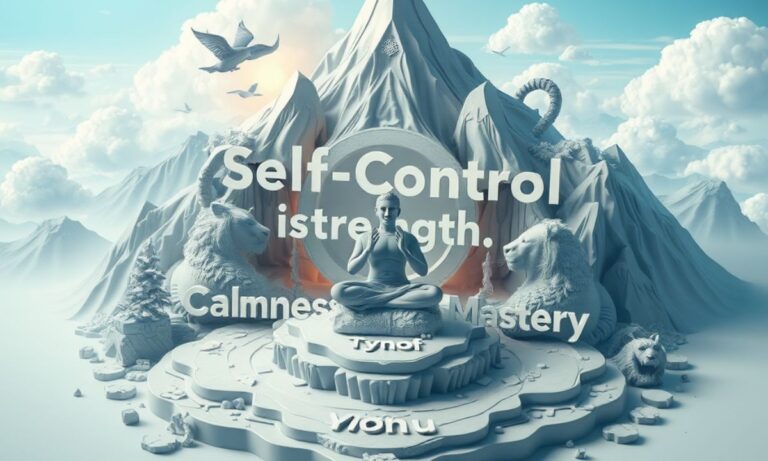Self-control and calmness are essential qualities that define true strength and mastery in life. In a world full of distractions and emotional triggers, the ability to stay composed and disciplined sets individuals apart. Those who can control their impulses and maintain inner peace are better equipped to handle challenges with wisdom and clarity.
This balance allows them to make thoughtful decisions rather than reacting impulsively.Calmness is not a sign of weakness but a reflection of deep inner strength and confidence. It enables individuals to navigate conflicts and stressful situations without being overwhelmed by emotions.
Self-control, on the other hand, fosters patience, resilience, and the ability to delay gratification for greater success. Together, these qualities create a powerful foundation for personal growth, effective leadership, and a fulfilling life.
The Evolving Landscape of Leadership

Leadership is constantly evolving, adapting to the dynamic challenges of the modern world. Traditional leadership models, once focused on hierarchy and authority, are being replaced by more inclusive, collaborative, and adaptive approaches.
In today’s fast-paced and digital-driven environment, leaders must embrace agility, emotional intelligence, and innovation to stay ahead. The ability to inspire and empower teams, rather than simply manage them, is now a defining trait of effective leadership.Technology, globalization, and shifting workplace dynamics have reshaped leadership expectations.
Remote work, diverse teams, and the demand for ethical and purpose-driven leadership require a fresh perspective. Successful leaders are those who cultivate resilience, foster a culture of trust, and continuously develop their skills. As leadership continues to evolve, those who adapt, listen, and lead with authenticity will thrive in the ever-changing landscape of the future.
Self-Control as the Foundation of Leadership Strength
Effective leadership is built on the foundation of self-control, a quality that enables leaders to navigate challenges with clarity and resilience. Leaders who master self-control can manage their emotions, make rational decisions, and respond thoughtfully rather than react impulsively.
This ability fosters trust and respect among team members, as they look to leaders who remain composed under pressure. By maintaining control over their actions and emotions, leaders set a powerful example for those they lead.Self-control also strengthens a leader’s ability to handle conflicts, setbacks, and high-pressure situations with grace.
It allows them to stay focused on long-term goals rather than being swayed by temporary frustrations or distractions. A leader with strong self-discipline can inspire confidence, encourage collaboration, and create a stable work environment. Ultimately, self-control is not just a leadership trait—it is the cornerstone of true strength and mastery in any leadership role.
Calmness as the Mastery of Leadership
Calmness is a defining trait of great leaders, allowing them to navigate crises and challenges with clarity and confidence. A calm leader fosters a sense of stability, reassuring their team even in the face of uncertainty. Instead of reacting impulsively to stress or conflict, they assess situations rationally and make well-informed decisions.
This ability to remain composed under pressure strengthens leadership credibility and encourages a productive, solution-focused environment.Mastering calmness also enhances a leader’s emotional intelligence, improving communication and team dynamics. When leaders approach problems with patience and a steady mindset, they inspire trust and respect among their peers.
Calm leadership promotes a culture of thoughtful problem-solving and encourages others to manage their emotions effectively. In the ever-evolving landscape of leadership, true mastery lies in the ability to lead with a composed, collected, and strategic approach.
You – Tymoff: The Personal Journey of Leadership

Leadership is not just about guiding others; it is a personal journey of growth, self-discovery, and resilience. The philosophy of “You – Tymoff” emphasizes that true leadership starts from within, requiring self-awareness, discipline, and emotional intelligence.
Leaders who embark on this journey understand that self-control is strength, and calmness is mastery. By developing these traits, they cultivate the ability to make thoughtful decisions and inspire those around them.
Every leader faces challenges that test their patience, adaptability, and vision. Those who embrace personal growth and strive for continuous improvement set themselves apart as true masters of leadership.
Leadership is not about power or authority but about influence, trust, and the ability to uplift others. By focusing on self-mastery, individuals unlock their full leadership potential, making a lasting impact on both their personal and professional lives.
Integrating the Tymoff Philosophy into Leadership Development
- Enables leaders to make rational decisions rather than emotional reactions.
- Builds resilience to navigate challenges with confidence.
- Fosters trust and stability within teams.
- Encourages a disciplined, long-term approach to success.
Calmness as Mastery
- Helps leaders maintain composure in high-pressure situations.
- Creates a stable and reassuring environment for teams.
- Enhances emotional intelligence and effective communication.
- Encourages thoughtful problem-solving and innovation.
Practical Integration into Leadership
- Incorporate self-discipline exercises into leadership training.
- Promote mindfulness and stress management techniques.
- Encourage a culture of patience, adaptability, and ethical decision-making.
- Lead by example, demonstrating calmness and self-control in daily interactions.
Benefits for Organizations
- Strengthens team cohesion and trust in leadership.
- Improves overall decision-making and problem-solving efficiency.
- Creates a work culture focused on stability, innovation, and growth.
- Prepares leaders to navigate the evolving landscape of leadership with confidence.
In Action
Leading with Self-Control
- Leaders demonstrate self-control by remaining calm in stressful meetings and addressing conflicts with thoughtful solutions.
- They prioritize long-term goals, even when faced with short-term setbacks, ensuring consistency and focus within the team.
- Self-control fosters an environment where emotional reactions are managed, leading to a more collaborative and productive team dynamic.
Exemplifying Calmness Under Pressure
- In high-stress situations, calm leaders make rational decisions, helping the team stay focused and aligned with objectives.
- They maintain clear communication, ensuring team members feel supported and confident, regardless of external pressures.
- Calmness allows leaders to inspire their teams, even during periods of uncertainty, creating a sense of stability and trust.
Training and Development
- Leadership programs incorporate self-control and calmness techniques, such as mindfulness training or conflict resolution workshops.
- Leaders are encouraged to practice self-reflection, assess their responses to challenges, and seek continuous improvement.
- The Tymoff philosophy is modeled in everyday interactions, where leaders consistently demonstrate these principles in both minor and major decisions.
Results and Impact
- Teams led by individuals who integrate self-control and calmness tend to have higher morale, productivity, and collaboration.
- These leaders are better equipped to make sound decisions, fostering an environment where growth and innovation can thrive.
- Over time, the organization develops a culture of composed leadership, leading to sustainable success and greater overall performance.
Frequently Asked Questions
What is the Tymoff philosophy in leadership?
The Tymoff philosophy emphasizes self-control as strength and calmness as mastery for effective leadership.
How does self-control benefit leadership?
Self-control allows leaders to make rational decisions and maintain stability in challenging situations.
Why is calmness important for leaders?
Calmness helps leaders stay composed under pressure, ensuring thoughtful decision-making and team confidence.
Can self-control and calmness be developed in leadership?
Yes, both qualities can be cultivated through practice, mindfulness, and self-awareness.
How does the Tymoff philosophy impact team performance?
Leaders who practice self-control and calmness inspire trust, improving team morale and productivity.
Conclusion
In conclusion, the integration of self-control and calmness into leadership practices forms the foundation of truly effective leadership. Leaders who master these qualities are better equipped to navigate challenges, inspire their teams, and foster a positive, productive environment.
By embracing the Tymoff philosophy, leaders not only strengthen their own abilities but also enhance the cohesion and performance of their teams. This approach ensures that leadership remains focused, thoughtful, and resilient in the face of any challenge.

Hayat is a skilled content writer and SEO expert with 5 years of experience, specializing in digital marketing, SEO strategies, and content creation for various platforms.


![450+ Badass Panther Names [Fierce, Mystical & Unique Ideas] 450+ Badass Panther Names [Fierce, Mystical & Unique Ideas]](https://namesvault.info/wp-content/uploads/2025/02/450-Badass-Panther-Names-Fierce-Mystical-Unique-Ideas-150x150.jpg)
![600+ Cute & Catchy Pigeon Names [Perfect Ideas for Your Flocks] 600+ Cute & Catchy Pigeon Names [Perfect Ideas for Your Flocks]](https://namesvault.info/wp-content/uploads/2025/02/600-Cute-Catchy-Pigeon-Names-Perfect-Ideas-for-Your-Flocks-150x150.jpg)

